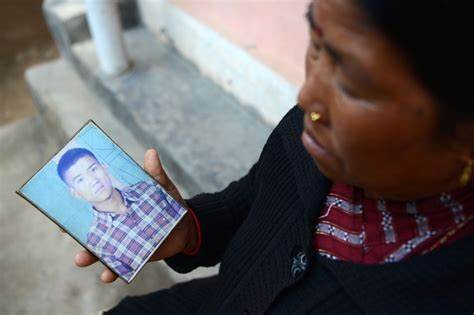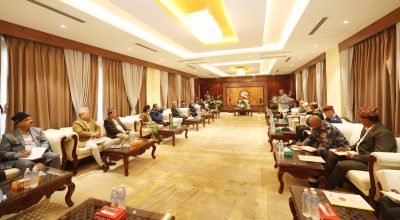
Kathmandu, March 6: The Human Rights Watch (HRW) group has suggested to revise the draft bill pending in the House of Representatives of Nepal in accordance with domestic, and the international standard.
Issuing a statement, the HRW has said that bill requires that both categories of violations (serious and not) are committed “in a targeted or planned manner against an unarmed individual or community.”
The statement reads:
The Nepali government’s proposed bill on transitional justice contains important provisions, including for reparations, relating to the country’s civil war but still needs significant amendments, Human Rights Watch and Advocacy Forum-Nepal said in a report published today. Public debate and human rights activism have helped improve the bill, but the current version risks shielding those responsible for some serious crimes, including war crimes and crimes against humanity, and denying some victims access to reparations.
The 50-page report, “Breaking Barriers to Justice: Nepal’s Long Struggle for Accountability, Truth and Reparations,” describes the decades-long struggle for justice by survivors and victims. Human Rights Watch and Advocacy Forum analyzed the proposed law and reviewed some emblematic cases that faced obstruction by the authorities. They also described obstacles to justice faced by survivors of sexual violence and relatives of victims who filed complaints in 62 cases of conflict-era extrajudicial killings with the assistance of Advocacy Forum. The bill requires amendments to meet victims’ needs as well as legal standards set by the Supreme Court and clearly established in international law.
“To deliver a durable and rights-respecting process without further delay, Nepal’s leaders should agree to amendments called for by victims and recommended by legal experts, then ask parliament to pass the bill into law,” said Meenakshi Ganguly, deputy Asia director at Human Rights Watch. “This is a moment of opportunity to deliver the truth, justice, and reparations long sought by victims and help protect the rights of all Nepalis in the future.”
It has been almost 18 years since the decade-long civil war in Nepal between Maoist insurgents and government forces ended with the 2006 Comprehensive Peace Agreement. Conducting a transitional justice process remains the major outstanding commitment of the peace agreement. The war killed up to 17,000 people and left up to 3,288 others “disappeared.”
On his visit to Nepal in October 2023, United Nations Secretary-General António Guterres noted that Nepal is closer than ever before to beginning a meaningful transitional justice process. In November, Prime Minister Pushpa Kamal Dahal, who was the leader of the Maoist insurgency, said: “The victims want the speedy advancement of this process. The government too shares the same aspiration.” However, there is a risk that the process will unravel again if the proposals to amend the transitional justice law currently before parliament fall short or if momentum is lost, the groups said.
Accountability for serious crimes under international law is essential to uphold victims’ rights and ensure sustainable peace. The UN special rapporteur on the promotion of truth, justice, reparation and guarantees of non-recurrence has identified five pillars of transitional justice: truth, justice, reparations, memorialization, and guarantees of non-recurrence. The current bill provides for reparations and interim relief for some victims, including victims of torture and rape, who were left out of earlier relief packages. It guarantees the right of the families of victims of enforced disappearance to their relatives’ property. It also mandates the Truth and Reconciliation Commission (TRC) to study the root causes and impact of the conflict and recommends institutional reforms.
Under the proposal, the TRC and Commission for Investigation on Enforced Disappeared Persons (CIEDP) would be the sole bodies investigating alleged crimes committed during the conflict. Cases classified as “serious violations of human rights” could be referred to and prosecuted in a special court. The bill’s definition of “serious violations” includes rape, enforced disappearance, “cruel or inhuman torture,” and a definition of unlawful killing that remains to be finalized. However, the bill excludes numerous serious crimes under international law, including some acts of torture and other unlawful killings, creating a significant accountability gap, the groups said.
In a separate category, the bill defines “violations of human rights” other than those considered “serious” as “any acts against the domestic law, international human rights law or humanitarian law,” which cannot be referred to the special court. Because this category of crimes is excluded from prosecution, this language risks providing de facto amnesty to those responsible for some serious human rights violations and grave crimes under international law. Amnesty for serious crimes is contrary to Nepali and international law and standards and violates victims’ rights.
Importantly, the bill requires that both categories of violations (serious and not) are committed “in a targeted or planned manner against an unarmed individual or community.” This means that alleged perpetrators of crimes committed against combatants, or in a non-targeted or unplanned manner, are excluded from any possibility of criminal accountability. It also implies that the victims of these crimes are not eligible for consideration for other measures outlined in the bill, such as reparations.
The bill does not ensure the independent appointment of judges to the special court, nor does it provide for the financial independence of the transitional justice bodies.
Many survivors of sexual violence, who have faced trauma and severe social stigma, were unable to register their cases when conflict-era human rights violations were being recorded by the government between 2016 and 2018. The currently proposed window of three months to register sexual violence cases is inadequate, the groups said.
Nepal previously adopted a transitional justice law in 2014, but it was struck down by the Supreme Court in 2015 because it provided amnesty for perpetrators of serious crimes. The TRC and CIEPD were established by the 2014 law and have registered over 60,000 cases, but have failed to resolve a single one. There has been little or no progress in the 62 complaints of conflict-era extrajudicial killings that have been registered with the police with the support of Advocacy Forum, which are tracked in this report and a series of five previous reports since 2008. Victims of rights violations committed during the conflict have gone to the transitional justice commissions, to Nepali courts, to the United Nations, and to foreign jurisdictions seeking justice to no avail.
In numerous statements made during and after Secretary-General Guterres’s recent visit to Nepal, victims’ groups called for a process that includes all the different elements of transitional justice, including criminal accountability and reparations.
It is widely recognized that a lack of accountability for conflict-era violations has led to a crisis of impunity in Nepal, the groups said. The police and security forces are rarely, if ever, investigated for deaths in custody allegedly resulting from torture or for killing protesters by using excessive force. Nor are politicians and officials held accountable for widespread corruption that undermines public services and violates economic and social rights.
Nepal’s international partners should follow the UN’s lead by only offering support for a process that meets Nepali and international legal standards, Human Rights Watch and Advocacy Forum said. They should also ensure that any donor support is delivered in a way that ensures best practices, including transparency and independence from the government, such as a funding structure under UN auspices.
“If the transitional justice bill is passed without appropriate amendments, it risks hindering the search for justice,” said Bikash Basnet, director of Advocacy Forum. “If it is appropriately amended, it can be the basis for a meaningful, nationally-owned process that upholds the rights of victims and benefits all Nepalis by strengthening institutions and the rule of law.”













